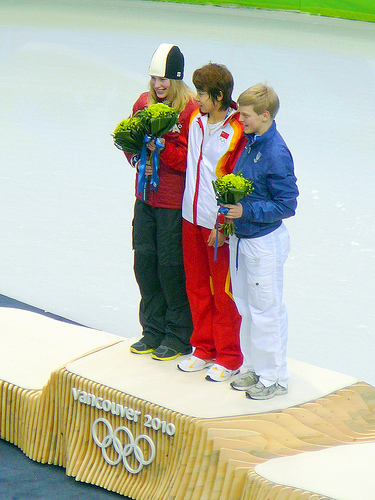Pride is pleasure arising from a man’s thinking too highly of himself. – Baruch Spinoza

The lady in the middle won the Olympic Gold Medal. But she was humble enough to invite the other ladies to join her at the top.
What does that mean?
I have heard many definitions of the less-useful version of pride before, but I believe this one is about as short and sweet as it could possibly be.
The less-useful version of pride does indeed give pleasure to the prideful person. And that is the main disadvantage it has, as the pleasure can easily blind the person to the excess in which they indulge.
That excess is named at the end of the quote; they think too highly of themselves. Useful pride becomes less useful when one loses track of proportion and begins to believe their own exaggerations.
Unfortunately, it is often an out-of-control reaction, causing the person’s perception of their own value or worth to run away, never looking back. And that’s what the quote is warning us against.
Why is humility important?
Humility, or the ability to not boast of one’s ability, is the opposite of the less-useful pride. It is also the antidote for such behavior. By being humble, one by definition thinks a little less highly of oneself. It isn’t a matter of not being good, you just don’t tell everyone you meet how good you are.
Humility also allows others to share in the spotlight, or for the humble person to step out of the spotlight all together. That is the basis of another great quote about not worrying about who will get the credit. If you don’t mind letting others have their moment (or two) in the spotlight, that is.
What happens if you let someone else get the credit? What gets hurt? Your pride? If that is all, then the degree to which you recoil from that injury gives you a hint about where on the humble-to-prideful scale you presently are, right? That might be something for you to think about.
Humility isn’t a total abandonment of our sense of pride in achievement. It is a reasonable amount of pride, proportional to what we have accomplished. If we managed a small victory, massive pride would be thinking too highly of ourself. Humility says a similarly small dose of pride is in order.
Where can I apply this in my life?
For those of you who are perfectly humble already, I guess this is where you quit reading, and head to the comment section and help the rest of us understand how to do this. The rest of us, we have some work to do, even if it is only a tiny little bit here and there, right?
For those on the other end of the scale, who think they’re the hottest thing to ever do whatever it is you do, you will need a little more help than can be provided by a simple blog post. Seek professional help before it becomes full-blown arrogance, and really messes up your life.
For the rest of us, it is time to look within ourselves and try to determine where we stand. We all have some level of pride, in who we are or in what we have accomplished. The question I would ask of you is what is the relationship between the size of your pride and what was done?
If the pride is larger, then a little more humility might be in order, right? But how does one do that? What I have found helpful is to remember that we did not do this alone. There are always helpers in our lives. If you have other ideas, please share them in the comment section below.
With the Olympics still ongoing, consider the achievement of a attaining the Gold Medal in your sport. How easy would it be, after working that hard for most of your life, to have a huge amount of pride? But what do they do? They listen to their National Anthem, and fight back the tears.
They know how much they have sacrificed, but they also know how much the medal means to both their friends and the rest of their country. Even mixed breeds like myself enjoy watching the Norwegians and the Dutch picking up medals in their favored sports. How about you, do you feel some pride?
Even in the solo (as opposed to the team) sports, no Olympian got there alone. They had trainers, supporters, other support people they worked with as they prepared for their attempt at a medal. Without all these people, they wouldn’t have much of a chance, and they know it.
With the knowledge of how much effort by so many other people went into their victory, it is hard to get too prideful. While they may stand alone on the podium, they know how many others played a part in the win. This helps to keep them grounded, and keeps their pride in check.
That is one way. What ways have you used in the past? Take a moment and think of the times when you might have been a little more prideful than was appropriate. How did you deal with it? Or did someone else deal with you? Sometimes the change comes from without instead of within, right?
What have you learned about yourself in the pursuit of your inner pride? How well do you manage it, and when does it get the better of you? How do you stay humble, and what do you do to try to correct yourself when you find your feet on the path of excess pride?
From: Twitter, @OprahsQuotes
confirmed at : https://en.wikiquote.org/wiki/Ethics_(book) search for “Prop. 26: Note”
Photo by TofflerAnn






